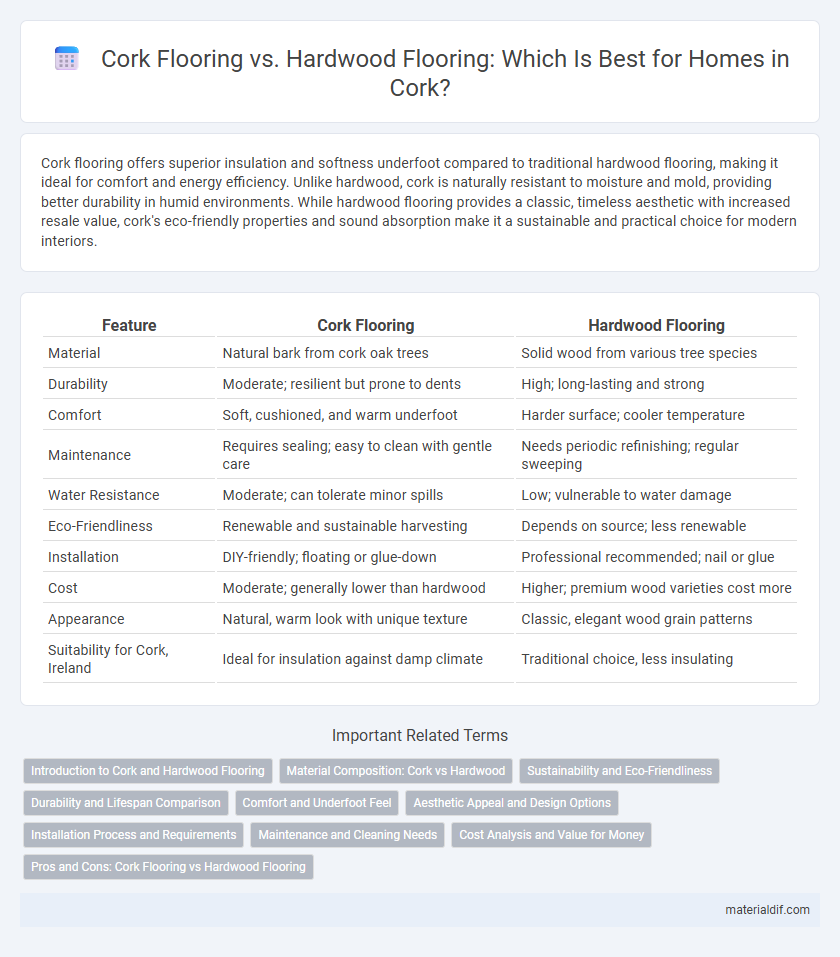Cork flooring offers superior insulation and softness underfoot compared to traditional hardwood flooring, making it ideal for comfort and energy efficiency. Unlike hardwood, cork is naturally resistant to moisture and mold, providing better durability in humid environments. While hardwood flooring provides a classic, timeless aesthetic with increased resale value, cork's eco-friendly properties and sound absorption make it a sustainable and practical choice for modern interiors.
Table of Comparison
| Feature | Cork Flooring | Hardwood Flooring |
|---|---|---|
| Material | Natural bark from cork oak trees | Solid wood from various tree species |
| Durability | Moderate; resilient but prone to dents | High; long-lasting and strong |
| Comfort | Soft, cushioned, and warm underfoot | Harder surface; cooler temperature |
| Maintenance | Requires sealing; easy to clean with gentle care | Needs periodic refinishing; regular sweeping |
| Water Resistance | Moderate; can tolerate minor spills | Low; vulnerable to water damage |
| Eco-Friendliness | Renewable and sustainable harvesting | Depends on source; less renewable |
| Installation | DIY-friendly; floating or glue-down | Professional recommended; nail or glue |
| Cost | Moderate; generally lower than hardwood | Higher; premium wood varieties cost more |
| Appearance | Natural, warm look with unique texture | Classic, elegant wood grain patterns |
| Suitability for Cork, Ireland | Ideal for insulation against damp climate | Traditional choice, less insulating |
Introduction to Cork and Hardwood Flooring
Cork flooring is made from the bark of the cork oak tree, offering natural insulation, sound absorption, and resistance to moisture, making it ideal for kitchens and basements. Hardwood flooring, sourced from various tree species like oak, maple, or walnut, provides durability, classic aesthetics, and the ability to be refinished multiple times for long-term use. Both materials present eco-friendly options, with cork being highly renewable and hardwood offering a timeless look and structural strength.
Material Composition: Cork vs Hardwood
Cork flooring is made from the bark of the cork oak tree, harvested sustainably without harming the tree, providing a renewable and eco-friendly option. Hardwood flooring consists of solid wood planks derived from deciduous trees such as oak, maple, or walnut, prized for its durability and natural grain patterns. The cellular structure of cork offers natural insulation and cushioning, while hardwood provides a solid, long-lasting surface that can be refinished multiple times.
Sustainability and Eco-Friendliness
Cork flooring offers superior sustainability compared to traditional hardwood flooring due to its renewable harvesting process that does not require tree felling. Cork is biodegradable, recyclable, and produced with minimal environmental impact, making it an eco-friendly choice for green building projects in Cork. Hardwood flooring, while durable, often involves deforestation and slower regeneration rates, posing greater ecological concerns in sustainable construction.
Durability and Lifespan Comparison
Cork flooring offers impressive durability due to its natural elasticity, making it resistant to cracking and denting, which is ideal for high-traffic areas. Hardwood flooring, while more prone to scratches and dents, can be sanded and refinished multiple times, extending its lifespan up to 100 years with proper maintenance. Cork generally lasts 10 to 30 years but requires more care to prevent moisture damage compared to the more robust hardwood options.
Comfort and Underfoot Feel
Cork flooring offers superior comfort and cushioning underfoot due to its natural cellular structure, which provides excellent shock absorption and warmth. Hardwood flooring, while durable and elegant, tends to be harder and less forgiving on joints during prolonged standing or walking. The inherent softness of cork makes it an ideal choice for areas where comfort and noise reduction are priorities, such as living rooms and bedrooms.
Aesthetic Appeal and Design Options
Cork flooring offers a unique, natural texture with warm tones that create a cozy and inviting atmosphere, providing design versatility through various finishes and patterns. Hardwood flooring delivers classic elegance and timeless beauty, available in a wide range of wood species, stains, and plank sizes to suit traditional and contemporary interiors. Both options enhance aesthetic appeal, with cork adding softness and resilience, while hardwood offers rich grain patterns and a polished look.
Installation Process and Requirements
Cork flooring offers a straightforward installation process, often featuring click-and-lock or glue-down options that accommodate DIY projects and require minimal subfloor preparation. Hardwood flooring installation demands precise moisture control and acclimatization periods to prevent warping, typically involving nailing or stapling to a wooden subfloor. Cork's flexibility and resilience allow for installation over various surfaces, whereas hardwood requires a more rigid and level foundation, impacting overall installation time and complexity.
Maintenance and Cleaning Needs
Cork flooring requires minimal maintenance with regular sweeping and occasional damp mopping to prevent moisture damage, offering natural resistance to mold and mildew. Hardwood flooring demands more intensive care, including periodic refinishing and protection from scratches and water exposure to maintain its durability and appearance. Both options benefit from using appropriate cleaning products to preserve their surface quality and extend lifespan.
Cost Analysis and Value for Money
Cork flooring typically costs between $3 to $8 per square foot, making it a more budget-friendly option compared to hardwood flooring, which ranges from $6 to $12 per square foot. Cork offers excellent value for money due to its durability, natural insulation properties, and eco-friendliness, while hardwood provides higher resale value and timeless aesthetic appeal. Choosing between cork and hardwood flooring in Cork depends on balancing upfront cost savings with long-term investment in home value and maintenance.
Pros and Cons: Cork Flooring vs Hardwood Flooring
Cork flooring offers superior cushioning, sound insulation, and eco-friendliness compared to hardwood, making it ideal for comfort and sustainability-conscious homeowners. Hardwood flooring boasts exceptional durability, timeless aesthetics, and higher resale value but tends to be more expensive, prone to scratches, and susceptible to moisture damage. Both options require specific maintenance: cork needs sealing to prevent moisture absorption, while hardwood demands regular polishing and care to maintain its finish.
Cork flooring vs Hardwood flooring Infographic

 materialdif.com
materialdif.com